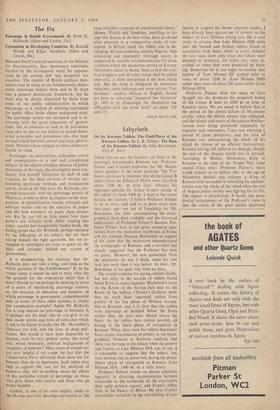The Fix
BERNARD SHAW'S cynical assertion, in the Maxims for Revolutionists, that 'democracy substitutes election by the incompetent many for appoint- ment by the corrupt few' was altogether too simpliste. The student of British political insti- tutions may be ready to see fundamentally demo- cratic intentions behind them and to fit them into a general democratic framework; but he must also be deeply impressed by those large areas of our public administration in which patronage, as a method of selecting individuals for public office, holds almost undisputed sway. The patronage system has increased and is in- creasing with the great expansion of govern- ment, but its existence as well as its prevalence must also be due to our failure to extend demo- cratic principles and procedures into that huge no-man's-land between central and local govern- ment. Ministers have stepped in where democrats feared to tread.
Patronage—its assumptions, techniques, extent and consequences—is a vast and complicated subject. In the almost complete absence of public discussion of the topic, the investigator must con- stantly find himself hampered by lack of real evidence, by the thick curtains of secrecy sur- rounding patronage methods and transactions and by dread of the libel laws. Dr. Richards, con- cerned exclusively with the patronage powers of Ministers, is able to show in chapters on the com- position of administrative boards, tribunals and advisory bodies and on the selection of judges and JPs how extensive on paper these powers are. But he can tell us little about how these powers are actually used. After reading this sober, careful but occasionally leaden book, the feeling grows that Dr. Richards, perhaps daunted by the difficulties of his subject, has not been asking himself the right questions, has not at- tempted to investigate (or even to guess at) the ideas and attitudes behind our system of government.
It is disappointing, for instance, that Dr. Richards does not take a long, cool look at the whole question of 'the Establishment.' If, in the cruder sense, it cannot be said to exist, what are the grounds for the widespread belief that it does? Should we not perhaps be thinking in terms of a series of interlocking patronage systems, as, for instance, in education and business, of Which patronage in government, comprehensible only in terms of these other systems, is simply one conspicuous example? Again, Dr. Richards has a long section on patronage in honours. It is perhaps not his fault that he can give us no new inside stories and little of substance which is not to be found in books like Mr. Macmillan's Honours for Sale and the lives of dead poli- ticians. But would it have been impossible to analyse, even in very general terms, the social and, where necessary, political background of recipients of honours? Mere totals of awards are
not very helpful if we accept the fact that the Conservative Party obviously finds more use for honours than do its opponents. Such tables may help to support the case for the abolition of honours; they tell us nothing about the effects of this particular stream of patronage on those who give, those who receive and those who go empty-handed.
Gibbon, in one of his most delphic asides in the Decline and Fall, describes corruption as 'the most infallible symptom of constitutional liberty.' Messrs. Wraith and Simpkins, unwilling to ac- cept this dictum at its face value, have produced what amounts to a comparative study of cor- ruption in Britain (until the 1880s) and in de- veloping African countries, notably Nigeria. This interesting and reasonably thorough survey is supported by sensible recommendations for those countries where the injunction carved on Kwame Nkrumah's statue in Accra, 'Seek ye first the poli- tical kingdom and all other things shall be added unto you,' is often interpreted in the most literal way. But the book is disfigured by numerous misprints, some ludicrous and some serious. Two instances: readers, African or English, should not have to substitute- 'inventors' for 'investors' (p. 149) or to disentangle for themselves the difficulties with the word 'book' on pages 136 and 175.
ANGUS MACINTYRE






























 Previous page
Previous page